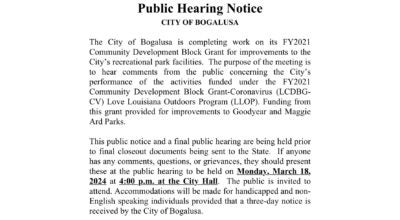Heart Study a partner in new blood sugar research grant
Published 4:30 am Wednesday, May 15, 2019
A consortium of Louisiana scientists from LSU’s Pennington Biomedical Research Center, Tulane University and Mary Bird Perkins Cancer Center is aiming to discover how blood sugar levels early in life contribute to a person’s brain health in middle age.
Scientists say these results could lead to new blood sugar management guidelines for children and help prevent late-life cognitive decline — a condition for which there is no effective treatment.
“The Bogalusa Heart Study is one of the longest, ongoing studies of a biracial, semi-rural community in the South,” said Dr. Owen Carmichael, co-principal investigator and director of Pennington Biomedical’s Biomedical Imaging Center. “It is the only study that collected assessments of the community members’ metabolic status from early childhood through mid-life. This study will add measurements of brain health as well as cognitive performance in mid-life.”
Carmichael and colleagues will use Positron Emission Tomography (PET) and Magnetic Resonance Imaging (MRI) scans to assess brain health in study participants.
In addition to being a treatment center for cancer, Mary Bird Perkins has expertise with imaging technologies that can also permit assessment of brain health. Approximately 200 Bogalusa Heart Study volunteers will receive PET scans at the Mary Bird Perkins facility in Hammond, according to Dr. Jonas Fontenot, Chief Operating Officer and Chief of Physics at Mary Bird Perkins Cancer Center and study co-investigator.
“We are excited to play a role by offering advanced imaging services for this important research,” Fontenot said. “This is a collaboration that we hope will inform future healthcare decisions and impact prevention of disease. As an organization, we continue to seek ways to advance medicine and work with likeminded institutions dedicated to enhancing healthcare in Louisiana.”
“This imaging data will be linked to the same participants’ blood glucose levels from their childhood years in the Bogalusa Heart Study,” added Tulane University’s co-principal investigator Dr. Lydia Bazzano.
Biostatistical tests will then be used to determine if any relationship exists between the blood sugar levels the volunteers experienced in childhood and brain health markers — including Alzheimer’s disease markers — measured via PET and MRI in midlife.
The study is officially titled “Early Life Glycemic Status and Alzheimer’s Disease Neuroimaging Markers in Middle Age: The Bogalusa Heart Study.” The short version of the title is “The Bogalusa Heart Study – Brain 2,” or “BHS – Brain 2.” The study is expected to begin recruitment on Wednesday, May 15.
Bazzano and Carmichael are co-principal investigators on the five-year, $3.5 million grant, which includes sub awards to Pennington Biomedical of $1 million, and Mary Bird Perkins of $1.4 million. Participants in the Bogalusa Heart Study who are interested in the new study should contact the Tulane Center for Lifespan Epidemiology Research at 985-735-9861 or visit online at www.clersite.org/contact.




